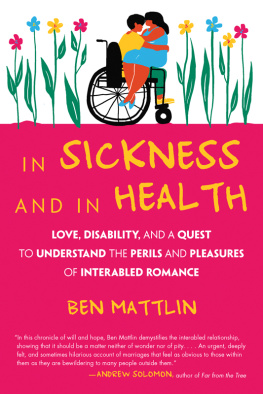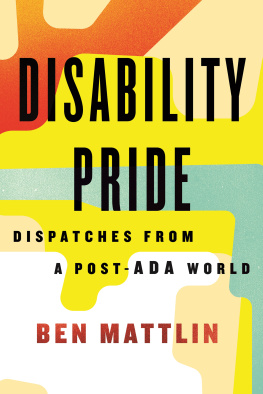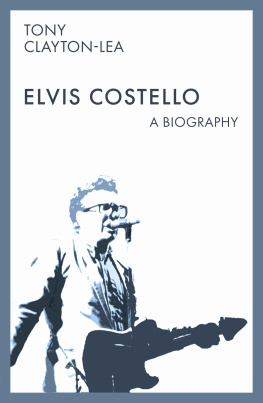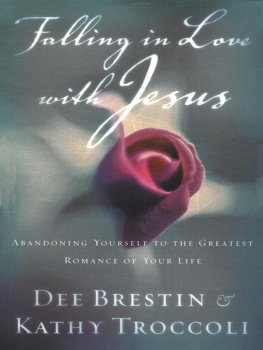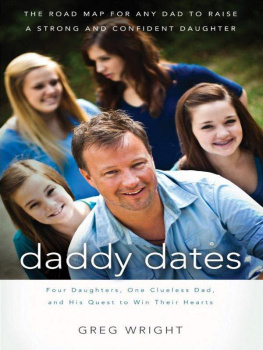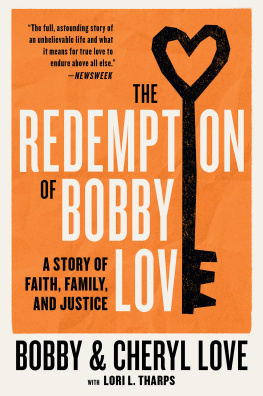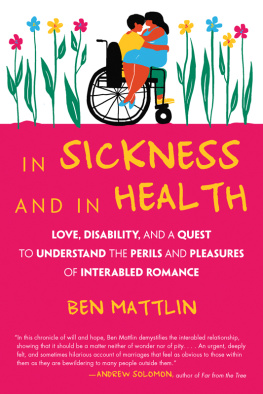
For my wife and daughters:
I love you. Maybe thats all that needs to be said.

Three years on, I was still the one washing his body every other day with a wet cloth, shaving his face, clipping his nails, cutting his hair. I fed him his food and helped him on the bedpan, and I wiped him clean, the way you do an infant, and I washed the soiled diapers I pinned on him. In that time, we had developed between us an unspoken language born of familiarity and routine, and, inevitably, a degree of previously unthinkable informality had seeped into our relationship.
KHALED HOSSEINI , And the Mountains Echoed
For most of us, theres nothing wrong that couldnt be fixed with civil rights and some really gnarly sex!
PAUL K. LONGMORE , in conversation
INTRODUCTION
BACK IN 2012 , I had the good fortune of publishing a book. That book. You know, the one able-bodied people are always telling crips to do because theyre sure it would be so inspirational!in short, a memoir about growing up with a severe disability and somehow prospering.
Indeed, being unable to walk or even scratch my nose hadnt prevented me from going to Harvard. I was one of the first quadriplegics to matriculate, if not the first (bragging rights not yet fully established). It hadnt prevented me from marrying (and staying married for twenty-six years now, and counting), having two delightful children, and forging a career as a freelance journalist. But of course, you already know all that, if youve read my first book.
Miracle Boy Grows Up introduced people to spinal muscular atrophy, the neuromuscular incapacity with which I was born. I have no muscles but full sensation (more about that later). I learned to live with it just as the world was learning to live with people with disabilities as a political force, a civil rights movement. But what to do for a follow-up? Im not Mary Karr! My life only has one book in it.
Some readers were insistent. A number of them suggested I delve deeper into my marriage, expose the secret spats and salacious highlights. But I didnt want to turn myself and my wife, Mary Lois (who does not have a disability of her own, poor thing), into gossip fodder, thank you very much.
Yet the nugget of an idea began to form.

Surely, we cant be the only interabled couple, for lack of a better term. Quick research showed that, although the statistics are unreliable, there are many marriages between people with and people without disabilities. And as the population ages and medical and technological advances enable people to survive illnesses and injuries in greater numbers than ever before, more and more folks are finding themselves in more or less our situation.
To the media and general public, though, this kind of amatory partnering is often treated as an odd phenomenon. Not long ago, the cover of People magazine flaunted the marriage of Gabby Giffordsthe brain-injured former congresswomanand her husband, astronaut Mark Kelly, as a special but unconventional love affair. Is that supposed to be flattering? This treacly hooey could give you diabetes!
I also keep hearing and reading about the aging population, this wave of debility and decay thats creating a caregiving crisis (New York Times, February 26, 2014, among others). To me, this trend dovetails with the worrisome news of veterans who are returning from Iraq and Afghanistan with disabling injuriesthe wounded warriors with young spouses who dont know how to cope with their disabilities.
I know strangers frequently regard M.L. and me as either tragic or noble. (Were neither.) At the root of all this wonder and puzzlement, I think, is simple curiosity: How do they get by? Will they be all right? To put it another way, what people really ponder is: What kinds of pressures does disability put on a marriage? (The former activist in me protests: These quandaries are predicated on outmoded, unflattering presumptions that people with disabilities are nothing but burdens and liabilities! Certainly we bring more to our marriages than our bodily limitations!)
In an age when interracial and interfaith marriages are common, it seems odd that romances like ours still leave people perplexed and awestruck. Many times Ive heard M.L. calmly explain to the inquisitive, I simply fell in love with a guy who happened to be in a wheelchair. Nothing noble or self-sacrificing about it. (In funny moments, shes added, Its not like he was a Republican or something!)
While this is certainly true, itd be foolish to deny the challenges inherent in interabled conjugality. Financial challenges, emotional challenges, andyesphysical challenges. No doubt it was a tad bold and nave of us to trust that love would overcome all differencesif, indeed, differences need overcoming. Now that were past fifty, M.L. and I can concede that some reflection about how exactly weve managed might prove fruitful. I myself sometimes wonder: Why did she want to tie up her life with mine? And what gave mea man who depends on round-the-clock personal-care assistancethe chutzpah to imagine, even expect, he could marry and live a normal life like anyone else?
On the other hand, M.L. and I enjoy an undeniable degree of closeness, a give-and-take that other couples might envy. We finish each others sentences, not always correctly but usually close enough. More than that, we can anticipate each others moods or reactions to stimuli. She can get me comfortable in my chair when I cant even figure out how to ask or what to ask her for. As for me, well, I can never understand why, in movies, men dont know their wives are pregnant until the wives divulge it like a big secret. Werent they keeping track of their wives menstrual cycles? Dont all guys do that, or am I the anomaly? (Probably something in between all guys and only me, but still.)
Is our brand of symbiotic intimacy unique to our in-sync personalities, or could it be a function of our complementary differences, of interabled couplehood in general? Is this, in short, a benefit? (And if so, somebody had better tell those couples who are newly facing disability, before panic and anxiety destroy them!) Did we arrive at it naturally or is it something weve developed and honed over time? And perhaps most crucial of all, can it last?
To shed light on these and other related mysteries, to gain a stronger self-knowledge and advocate for others who may be facing similar questions and judgments, I embark on a quest to zero in on the glue that binds M.L. and me, to study what sticks interabled couples together and perhaps simultaneously give hope to those who are struggling with the mating game. Ill endeavor to accomplish all this through frank conversations with a variety of twosomes at different stages of their romantic lives and from different backgrounds. By coaxing them to share their journeys, I hope to unearth a rich vein of compelling and instructive group-wisdom. My mission, I realize, may reveal something I dont want to see. Like picking at a scab, I might expose lingering insecurities that remain raw and unresolvable. Yet I hope to come out on the other end with not only a better understanding of my own marital bond but also insights into why certain interabled marriages fail while others survive despiteor perhaps because of?incredible strains.

